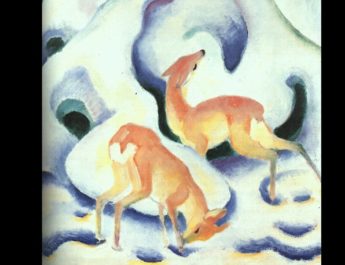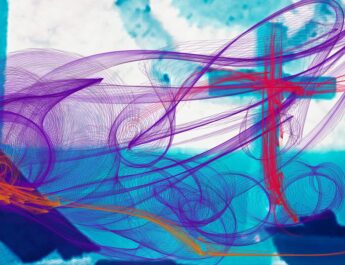Psalm 86:1-10, 16-17
Proper 7A
A PrayerA of David.B
1 InclineC your ear,D O Lord,E and answerF me,
A “prayer” = tephillah. From palal (to judge for oneself or in an official capacity; to pray or make supplication, to entreat). This is prayer or intercession. It can also be a hymn.
B “David” = David. From the same as dod (beloved, love, uncle); the root may mean to boil, which is used figuratively to describe love. So, this implies someone you love such as a friend, a lover, or a close family member like an uncle. David’s name likely means something like “beloved one.”
C “incline” = natah. This is to stretch or spread out, to extend, or bend. In can also imply moral deflection.
D “ear” = ozen. This is ear, hearing, audience, show. Properly, it is broadness – applied to its ear in reference to its shape.
E “Lord” = YHVH. From havah (to be, become) or hayah (to come to pass, become, be). This is the name of the God of Israel, the self-existent and eternal one, the tetragrammaton. This pronunciation has been lost to time so “Lord” is generally used in its place.
F “answer” = anah. This is answer, respond, announce, sing, shout, or testify. It means to pay attention, which implies responding and, by extension, starting to talk. Used in a specific sense for singing, shouting, testifying, etc.
for I am poorG and needy.H
2 PreserveI my life,J for I am devotedK to you;
G “poor” = ani. From anah (to be bowed down; humility or being browbeaten, oppressed, afflicted, or depressed; literal or figurative – depressed in mood or circumstance). This is humble, lowly, poor, or afflicted.
H “needy” = ebyon. From abah (to consent, obey, want, yield, accept). This is needy, poor, beggar. Someone who is wanting.
I “preserve” = shamar. This is to keep, watch, or preserve. It means to guard something or to protect it as a thorny hedge protects something.
J “life” = nephesh. Related to naphash (to refresh or be refreshed). This is soul, self, person, emotion. It is a breathing creature. Can also refer to appetites and desires.
K “devoted” = chasid. From chasad (being good, kind, merciful; may mean bowing one’s neck as is done in the presence of an equal for courtesy’s sake; so, if one in a superior position is treating you like an equal, that is what is captured here). This is faithful, kind, pious, merciful, or gracious. It can also refer to godly or pious people. This is where Chasidic Jews take their name from.
saveL your servantM who trustsN in you.
You are my God;O 3 be graciousP to me, O Lord,Q
L “save” = yasha. To deliver, defend, help, preserve, rescue, be safe. Properly, to be open, wide or free, which implies being safe. Used causatively, it means to free.
M “servant” = ebed. From abad (to work, serve, compel; any kind of work; used causatively, can mean to enslave or keep in bondage). This is a servant, slave, or bondservant.
N “trusts” = batach. This is to hide for refuge, be secure or sure. Figuratively, it refers to trust, being confident, or hoping.
O “God” = Elohim.
P “be gracious” = chanan. This is to beseech, show favor, be gracious. Properly, it is to bend in kindness to someone with less status.
Q “Lord” = Adonai. From adon (lord, master, owner); root means to rule or be sovereign. This is the actual Hebrew word for Lord used (in a different form) of humans and (in the present form) of God. It means someone who is in control.
for to you do I cryR allS dayT long.
4 GladdenU the soulV of your servant,
for to you, O Lord,W I lift upX my soul.
R “cry” = qara. This is to call or call out – to call someone by name. Also used more broadly for calling forth.
S “all” = kol. From kalal (to complete). This is all or every.
T “day” = yom. Root may mean being hot. This is the day in a literal or figurative sense. It can also mean birth, age, daylight, continually or other references to time.
U “gladden” = samach. This is to rejoice or be glad. Properly, it is to brighten up in a literal or figurative sense.
V “soul” = nephesh. Same as “life” in v2. See note J above.
W “Lord” = Adonai. Same as “Lord” in v3. See note Q above.
X “lift up” = nasa. This is to lift in a broad sense, literally and figuratively. So it could be to carry, take, or arise. It could also be bring forth, advance, accept.
5 For you, O Lord,Y are goodZ and forgiving,AA
Y “Lord” = Adonai. Same as “Lord” in v3. See note Q above.
Z “good” = tob. From tob (to be pleasing, to be good). This is good, beautiful, pleasant, agreeable, bountiful, at ease. This word is used for goodness as a concept, a good thing, a good person. This can refer to prosperity and welfare as well as joy, kindness, sweetness, and graciousness. So, this is ethically good, but also enjoyably good.
AA “forgiving” = sallach. 1x in OT. From salach (forgive, pardon, spare). This is forgiving, placable.
aboundingBB in steadfast loveCC to all who callDD on you.
BB “abounding” = rab. From rabab (increasing in any aspect whether quantity, authority, size, quality, greatness, etc.). This is abundance, many, elder, exceedingly, great. It refers to abundance of amount, rank, or status.
CC “steadfast love” = chesed. Related to “devoted” in v2. From chasad (see note K above). This is favor, goodness, kindness, loving kindness, pity, reproach, or a good deed. When done by God to humanity, this is mercy/loving kindness. When done by humanity to God, it is piety.
DD “call” = qara. Same as “cry” in v3. See note R above.
6 Give ear,EE O Lord,FF to my prayer;
listenGG to my cryHH of supplication.II
EE “give ear” = azan. Related to “ear” in v1. Perhaps from ozen (see note D above). Properly, this is to expand or broaden one’s ear i.e. listen intently, pay attention, heed.
FF “Lord” = YHVH. Same as “Lord” in v1. See note E above.
GG “listen” = qashab. To listen, pay attention to, incline – used in the phrase incline the ears.
HH “cry” = qol. This is a sound, used often for human voices. Also used when God speaks or angels, animals or instruments. It can be a cry or a noise, thunder or earthquakes and so on.
II “supplication” = tachanun. Related to “be gracious” in v3. 18x in OT. From chanan (see note P above). This is entreaty, prayer, or supplication. It is looking for favor earnestly.
7 In the day of my troubleJJ I call on you,
for you will answer me.
8 There is noneKK like you among the gods, LLO Lord,MM
nor are there any worksNN like yours.
JJ “trouble” = tsarah. From tsar (properly, a narrow or constricted place; figuratively, trouble, a pebble, an enemy, anguish, or distress); from tsarar (to bind, restrict, narrow, be cramped, an adversary). This is tightness, distress, affliction, trouble, or adversary.
KK “none” = ayin. Perhaps from a word that means to be nothing. This means nothing, none, non-existent. It can also simply mean not or are not.
LL “gods” = elohim. Same as “God” in v2. See note O above.
MM “Lord” = Adonai. Same as “Lord” in v3. See note Q above.
NN “works” = maaseh. From asah (to do, make, accomplish, become). This is a work – any action whether positive or negative. It can also be a transaction, construction, activity, property, or something that is produced.
9 All the nationsOO you have madePP shall comeQQ
OO “nations” = goy. From the same root as gevah (the back, person, or body); related to gev (among); related to gaah (to rise up). This is nation or people. Often used to refer to Gentiles or foreign nations. It can also be used figuratively for a group of animals. This is where the Yiddish “goy” comes from.
PP “made” = asah. Related to “works” in v7. See note NN above.
QQ “come” = bo. This is to enter, come in, advance, fulfill, bring offerings, enter to worship, attack. It can also have a sexual connotation.
and bow downRR beforeSS you, O Lord,TT
and shall glorifyUU your name.VV
RR “bow down” = shachah This is to bow down, make a humble entreaty, to do homage to royalty or to God.
SS “before” = paneh. From panah (to turn, face, appear). This is face in a literal or figurative sense. It could be face, presence, anger, respect. It can also be used of God to indicate divine favor or presence.
TT “Lord” = Adonai. Same as “Lord” in v3. See note Q above.
UU “glorify” = kabad. To be heavy, weighty, or severe. It can also be positive abounding in, rich, or honorable. The Hebrew word for “glory,” kabod, is taken from this root.
VV “name” = shem. May be from sum (to put, place, set). This is name, fame, renown. A name was thought to indicate something essential about a person – something about their individuality. So, this word can also mean honor, authority, or character.
10 For you are greatWW and doXX wondrous things;YY
you aloneZZ are God.
WW “great” = gadol. From gadal (to grow up, become great, become wealthy – to advance. The root meaning may be to twist in the sense of the process of growing). This is great, high, bigger, noble, old, marvelous. It can also refer to someone who is powerful or distinguished.
XX “do” = asah. Same as “made” in v9. See note PP above.
YY “wondrous things” = pala. From pele (wonder, miracle, wonderful, marvelous thing). This is to be extraordinary, to arise, to be great or accomplish.
ZZ “alone” = bad. From badad (to divide or be separated; alone, solitary, lonely, isolated, straggler). This is apart, alone, separation, body part, tree branch, except. It can also be a city’s chief.
16 TurnAAA to me and be gracious to me;
giveBBB your strengthCCC to your servant;
save the childDDD of your maidservant.EEE
AAA “turn” = panah. Related to “before” in v9. See note SS above.
BBB “give” = natan. This is to give, put, set, offer. It is to give literally or figuratively.
CCC “strength” = oz. From azaz (to be strong, become fixed, be bold, prevail, be impudent; it means to be stout literally or figuratively. A Late Hebrew word). This is strength in the sense of force, majesty, praise, material and physical strength, the abstract notion of security. It can also speak of social or political power.
DDD “child” = ben. From banah (to build or obtain children). This is son, age, child. It is son in a literal or figurative sense.
EEE “maidservant” = amah. This is female servant or slave, handmaid.
17 ShowFFF me a signGGG of your favor,HHH
so that those who hateIII me may seeJJJ it and be put to shame,KKK
FFF “show” = asah. Same as “made” in v9. See note PP above.
GGG “sign” = ot. From avah (to mark, sign, point out); OR from uth (to agree). This is a sign in a literal or figurative sense. It could be a flag or monument. It could be evidence or a mark. It could also be an omen or a miracle.
HHH “favor” = tob. Same as “good” in v5. See note Z above.
III “hate” = sane. This is to hate, an enemy. It is a personal hatred and not an abstract one.
JJJ “see” = raah. This is to see in a literal or figurative sense so stare, advise, think, view.
KKK “put to shame” = bosh. Properly, this means to be pale, which implies shame, disappointment, or confusion.
because you, Lord,LLL have helpedMMM me and comfortedNNN me.
LLL “Lord” = YHVH. Same as “Lord” in v1. See note E above.
MMM “helped” = azar. This is to surround, which implies encircling to protect someone or help them out. It can also be help, ally, or support.
NNN “comforted” = nacham. Properly, this is a strong breath or a sigh. This can be to be sorry, to pity, console. Comfort, or repent. But, one can also comfort oneself with less righteous thoughts, so this can also mean to avenge oneself.
Image credit: “Red Balloon” by Hartwig HKD, 2008.




